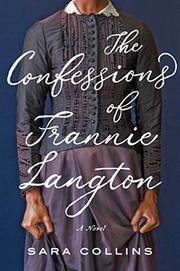


THE CONFESSIONS OF FRANNIE LANGTON
by Sara Collins
There’s betrayal, depravity, pseudoscience, forbidden love, drug addiction, white supremacy, and, oh yes, a murder mystery with tightly wound knots to unravel.
The citizenry of 1826 London has worked itself into near apoplexy over the sensational trial of “The Mulatta Murderess,” aka Frances Langton, a Jamaican servant accused of brutally stabbing her white employers to death. Though caught on the night of the murders covered with blood, Frances cannot remember what happened and thus cannot say whether or not she is guilty. “For God’s sake, give me something I can save your neck with,” her lawyer pleads. And so Frannie, who, despite having been born into slavery, became adept at reading and writing, tries to find her own way to the truth the only way she can: By writing her life’s story from its beginnings on a West Indian plantation called Paradise whose master, John Langton, is a vicious sadist. He uses Frannie for sex and as a “scribe” taking notes on his hideous experiments into racial difference using skulls, blood, and even skin samples. After a fire destroys much of his plantation, Langton takes Frannie to London and makes her a gift to George Benham, an urbane scientist engaged in the same dubious race-science inquiries. Frannie’s hurt over her abandonment is soon dispelled by her fascination with Benham’s French-born wife, Marguerite, a captivating beauty whose lively wit and literary erudition barely conceal despondency that finds relief in bottles of laudanum. A bond forms between mistress and servant that swells and tightens into love, leading to a tempest of misunderstanding, deceit, jealousy, and, ultimately, death. Collins’ debut novel administers a bold and vibrant jolt to both the gothic and historical fiction genres, embracing racial and sexual subtexts that couldn’t or wouldn’t have been imagined by its long-ago practitioners. Her evocations of early-19th-century London and antebellum Jamaica are vivid and, at times, sensuously graphic. Most of all, she has created in her title character a complex, melancholy, and trenchantly observant protagonist; too conflicted in motivation, perhaps, to be considered a heroine but as dynamic and compelling as any character conceived by a Brontë sister.
Collins invokes both Voltaire and Defoe here, and she forges an unlikely but sadly harmonic connection with both these enlightenment heroes in her gripping, groundbreaking debut.